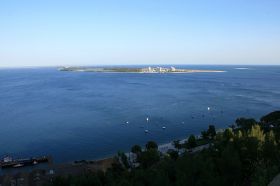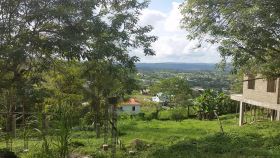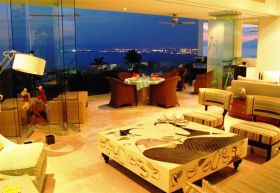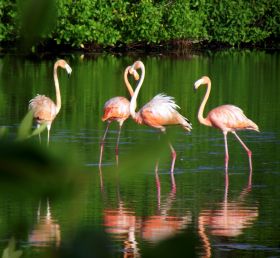
There are some absolutely beautiful islands in the Algarve near the border of Spain. To go there, you have to take a 40-minute boat ride. There are about six islands there. Only one of those six is deserted.
Up the coast towards the north, there is another island that is inhabited called Berlengas. It is a small island off the coast of Peniche. They have little summer cottages there, a lighthouse, a couple of restaurants, and a ferry that takes people over.
Because we are so surrounded by sea, on the far coast of Lisbon, we have a river, the Tagus, which separates Lisbon from the south. It is a large river that starts in Spain, crosses Portugal, and finishes in the mouth of Lisbon, at the Atlantic Ocean. So to go to the other side, you have to take bridges. There are three to four bridges. All of the land south of Lisbon, after these bridges, have a vast area of land very sandy, which are called the peninsulas. This is a natural reserve for dolphins. When you are on a boat or a ferry in these areas, you will see a lot of dolphins. Here, you will find an area called Tróia, which is a peninsula. Some of these areas become islands when it is high tide, which only happens at certain times of the year. It is a beautiful area of Portugal because this is where the river meets the sea. This is also a paradise for birdwatchers. They are now developing this area for tourism. A complex of condominiums were just built around this area with villas and timeshares. It is a vast area.
There is another development down in the Algarve, which is also in the peninsulas. This whole area is very stunning. It has lots of wildlife and they are very well preserved.
 Having lived in Belize as an ex-pat for almost 30 years, I guess I qualify as a bit of an expert on the country.
Having lived in Belize as an ex-pat for almost 30 years, I guess I qualify as a bit of an expert on the country. 


 The maximum cost for a housekeeper or a maid in Puerto Vallarta who comes every day would be approximately US $150 for a six-day week and that includes their lunches. On occasion, expats hire live-in maids for about the same rate, except you'll be furnishing them with living quarters and food.
The maximum cost for a housekeeper or a maid in Puerto Vallarta who comes every day would be approximately US $150 for a six-day week and that includes their lunches. On occasion, expats hire live-in maids for about the same rate, except you'll be furnishing them with living quarters and food. .png)
 There are some absolutely beautiful islands in the Algarve near the border of Spain. To go there, you have to take a 40-minute boat ride. There are about six islands there. Only one of those six is deserted.
There are some absolutely beautiful islands in the Algarve near the border of Spain. To go there, you have to take a 40-minute boat ride. There are about six islands there. Only one of those six is deserted.  My wife and I bought our first home in Chelem, Yucatan, Mexico in 2002. Our plans when we bought our house were to use it for our retirement, which at that time, was still years down the road. The more we visited our home, however, the more we fell in love with the Yucatan, so by the end of 2003 we moved to Mexico full-time. We worked and traveled throughout the Yucatan Peninsula, including Playa Del Carmen, Cozumel and Mahahual (in the state of Quintana Roo), and while they...
My wife and I bought our first home in Chelem, Yucatan, Mexico in 2002. Our plans when we bought our house were to use it for our retirement, which at that time, was still years down the road. The more we visited our home, however, the more we fell in love with the Yucatan, so by the end of 2003 we moved to Mexico full-time. We worked and traveled throughout the Yucatan Peninsula, including Playa Del Carmen, Cozumel and Mahahual (in the state of Quintana Roo), and while they...